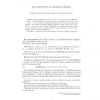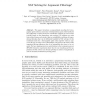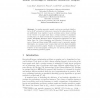2723 search results - page 8 / 545 » Learning lexicographic orders |
ECCC
2008
14 years 11 months ago
2008
Higman essentially showed that if A is any language then SUBSEQ(A) is regular, where SUBSEQ(A) is the language of all subsequences of strings in A. Let s1, s2, s3, . . . be the sta...
EACL
2006
ACL Anthology
15 years 16 days ago
2006
ACL Anthology
We present an adaptive technique that enables users to produce a high quality dictionary parsed into its lexicographic components (headwords, pronunciations, parts of speech, tran...
CORR
2006
Springer
14 years 11 months ago
2006
Springer
Abstract. This paper introduces a propositional encoding for lexicographic path orders in connection with dependency pairs. This facilitates the application of SAT solvers for term...
100
click to vote
WG
1999
Springer
15 years 3 months ago
1999
Springer
Abstract. In random geometric graphs, vertices are randomly distributed on [0, 1]2 and pairs of vertices are connected by edges whenever they are sufficiently close together. Layou...
111
click to vote
CSL
2008
Springer
15 years 28 days ago
2008
Springer
Abstract. We present a new proof of decidability of higher-order subtyping in the presence of bounded quantification. The algorithm is formulated as a judgement which operates on b...



